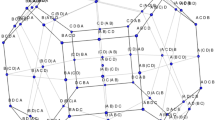Abstract
The paper surveys more than forty characterizations of scoring methods for preferenceaggregation and contains one new result. A general scoring operator is self-consistent ifalternative i is assigned a greater score than j whenever i gets no worse (better) results ofcomparisons and its “opponents” are assigned, respectively, greater (no smaller) scores thanthose of j. We prove that self-consistency is satisfied if and only if the application of ascoring operator reduces to the solution of a homogeneous system of algebraic equationswith a monotone function on the left-hand side.
Similar content being viewed by others
References
C. d'Aspremont, Axioms for social welfare orderings, in: Social Goals and Social Organizations: Essays in Memory of Elisa Pazner, eds. L. Hurwicz, D. Schmeidler and H. Sonnenschein, Cambridge University Press, Cambridge, 1985, pp. 19 – 76.
C. d'Aspremont and L. Gevers, Equity and the informational basis of collective choice, Rev. Econ. Studies 44(1977)199–209.
N. Baigent and Y. Xu, Independent necessary and sufficient conditions for approval voting, Math. Soc. Sci. 21(1991)21 – 29.
S. Barbera, Majority and positional voting in a probabilistic framework, Rev. Econ. Studies 46(1979) 379 –389.
J. Barzilai, W.D. Cook and B. Golany, Consistent weights for judgements matrices of the relative importance of alternatives, Oper. Res. Lett. 6(1987)131 – 134.
J. Barzilai and B. Golany, Deriving weights from pairwise comparison matrices: The additive case, Oper. Res. Lett. 9(1990)407 – 410.
D. Black, The Theory of Committees and Elections, Cambridge University Press, Cambridge, 1958.
D. Black, Partial justification of the Borda count, Public Choice 28(1976)1–16.
D. Blackwell and M.A. Girshik, Theory of Games and Statistical Decisions, Wiley, New York, 1954.
W. Bossert and J. Weymark, Utility in social choice, in: Handbook of Utility Theory, eds. S. Barberá, P.J. Hammond and C. Seidl, Kluwer, to appear.
D. Bouyssou, Ranking methods based on valued preference relations: A characterization of the net flow method, Eur. J. Oper. Res. 60(1992)61 – 67.
D. Bouyssou, A note on the sum of difference choice function for fuzzy preference relations, Fuzzy Sets Systems 47(1992)197 –202.
D. Bouyssou and P. Perny, Ranking methods for valued preference relations: A characterization of a method based on leaving and entering flows, Eur. J. Oper. Res. 61(1992)186 – 194.
J.R. Chamberlin and P.N. Courant, Representative deliberations and representative decisions: Proportional representation and the Borda rule, Amer. Polit. Sci. Review 77(1983)718 – 733.
P. Yu. Chebotarev, Generalization of the row sum method for incomplete paired comparisons, Automation and Remote Control 50(1989)1103 – 1113
P. Yu. Chebotarev, The row sum method and the models resulting in it, Transactions of the All-Union Institute for System Investigations No. 3(1989)94 – 110 (in Russian).
P. Yu. Chebotarev, On some optimization methods for aggregation of preferences, Transactions of the All-Union Institute for System Investigations No. 8(1990)67 – 72 (in Russian).
P. Yu. Chebotarev, Aggregation of preferences by the generalized row sum method, Math. Soc. Sci. 27(1994)293 – 320.
P. Yu. Chebotarev and E. Shamis, Preference fusion when the number of alternatives exceeds two: Indirect scoring procedures, in: Proceedings of Workshop on Foundations of Information /ecision Fusion, eds. N.S.V. Rao, V. Protopopescu, J. Bernen and G. Seetharaman, Acadiana, Lafayette, LA, 1996, pp. 20 – 32.
P. Yu. Chebotarev and E. Shamis, Incomplete preferences and indirect scores, Discussion paper No. 365.97, Departament d'Economia i d'Historia Economica, Universitat Autonoma de Barcelona and Institut d'Analisi Economica, CSIC, Barcelona, 1997.
P. Yu. Chebotarev and E. Shamis, Constructing an objective function for aggregating incomplete preferences, in: Constructing Scalar-Valued Objective Functions, eds. A. Tangian and J. Gruber, Springer, Berlin, 1997, pp. 100 – 124.
W.D. Cook and L.M. Seiford, On the Borda – Kendall consensus method for priority ranking problems, Management Sci. 28(1982)621 – 637.
A.H. Copeland, A “Reasonable” Social Welfare Function, University of Michigan Seminar on Applications of Mathematics to the Social Sciences, University of Michigan, Ann Arbor, 1951.
P. Coughlin, A direct characterization of Black's first Borda count, Econ. Lett. 4(1979)131 – 134.
D.J. Cowden, A method of evaluating contestants, American Statistician 29, No. 2(1975)82 – 84.
H.E. Daniels, Round-robin tournament scores, Biometrika 56(1969)295 – 299.
B. Debord, An axiomatic characterization of Borda's k-choice function, Soc. Choice Welfare 9 (1992)337 – 343.
G. Debreu, Representation of a preference ordering by a numerical function, in: Decision Processes, eds. R.M. Thrall, C.H. Coombs and R.L. Davis, Wiley, New York, 1954, pp. 159–165.
G. Debreu, Topological methods in cardinal utility theory, in: Mathematical Methods in the Social Sciences 1959, eds. K.J. Arrow, S. Karlin and P. Suppes, Stanford University Press, Stanford, CA, 1960, pp. 16 –26.
R. Deschamps and L. Gevers, Leximin and utilitarian rules: A joint characterization, J. Econ. Theory 17(1978)143 – 163.
Z. Domotor, Ordered sum and tensor product of linear utility structures, Theory and Decision 11(1979)375 – 399.
J. Duggan, Axioms for committee design, unpublished manuscript, 1993.
D. Farkas and S. Nitzan, The Borda rule and Pareto stability: A comment, Econometrica 47(1979) 1305–1306.
B. Fine and K. Fine, Social choice and individual ranking, Rev. Econ. Studies 41(1974)303–342, 459 – 475.
P.C. Fishburn, Preference, summation and social welfare functions, Management Sci. 16(1969) 179 – 186.
P.C. Fishburn, Should social choice be based on binary comparisons?, J. Math. Sociology 1( (1971) 133–142.
P.C. Fishburn, A comparative analysis of group decision methods, Behav. Sci. 16(1971)538 – 544.
P.C. Fishburn, Summation social choice functions, Econometrica 41(1973)1183 – 1196.
P.C. Fishburn, Axioms for approval voting: Direct proof, J. Econ. Theory 19(1978)180 – 185.
P.C. Fishburn, Symmetric and consistent aggregation with dichotomous voting, in: Aggregation and Revelation of Preferences, ed. J.-J. Laffont, North-Holland, Amsterdam, 1979, pp. 201 – 218.
P.C. Fishburn, On Harsanyi's utilitarian cardinal welfare theorem, Theory and Decision 17(1984) 21 – 28.
P.C. Fishburn, Interprofile Conditions and Impossibility, Fundamentals of Pure and Applied Economics, Vol. 18, Harwood Academic, Chur, 1987.
P.C. Fishburn and W.V. Gehrlein, Borda's rule, positional voting and Condorcet's simple majority principle, Public Choice 28(1976)79 – 88.
M. Fleming, A cardinal concept of welfare, Quarterly J. of Economics 66(1952)366 – 384.
J.M. Fleming, Cardinal welfare and individualistic ethics: A comment, J. Polit. Economy 65(1957) 355– 357.
P. Gärdenfors, Positionalist voting functions, Theory and Decision 4(1973)1 – 24.
L.A. Goodman and H. Markowitz, Social welfare functions based on individual rankings, Amer. J. Sociol. 58(1952)257 – 262.
H. Gulliksen, A least-squares solution for paired comparisons with incomplete data, Psychometrika 21(1956)125 – 134.
B. Hansson and H. Sahlquist, A proof technique for social choice with variable electorate, J. Econ. Theory 13(1976)193–200.
J.C. Harsanyi, Cardinal welfare, individualistic ethics, and interpersonal comparisons of utility, J. Polit. Economy 63(1955)309 – 321.
J.C. Harsanyi, Nonlinear social welfare functions, Theory and Decision 6(1975)311 – 332.
J.C. Harsanyi, Morality and the theory of rational behaviour, in: Utilitarianism and Beyond, eds. A. Sen and B. Williams, Cambridge University Press, Cambridge, 1982, pp. 39 – 62.
D. Henriet, Copeland choice function: An axiomatic characterization, Soc. Choice Welfare 2(1985) 49 – 63.
L. Katz, A new status index derived from sociometric analysis, Psychometrika 18(1953)39 – 43.
R.L. Keeney, A group preference axiomatization with cardinal utility, Management Sci. 23(1976) 140 – 145.
A.B. Khmelnitskaya, Social choice problems with different scales of individual welfares measurement for different subgroups of individuals, in: Operation Research Proceedings, Springer, Berlin, 1995, pp. 252 – 257.
J.-F. Laslier, Tournament Solutions and Majority Voting, Springer, Berlin, 1997.
R.D. Luce and H. Raiffa, Games and Decisions: Introduction and Critical Review, Wiley, New York, 1957.
T. Marchant, Valued relations aggregation with the Borda method, J. Multi-Crit. Decis. Anal. 5(1996)127 – 132.
T. Marchant, Cardinality and the Borda score, Discussion Paper MG 96/9, Université Libre de Bruxelles, 1996.
J. Marschak, Rational behavior, uncertain prospects and measurable utilities, Econometrica 18 (1950)111–141.
E. Maskin, A theorem on utilitarianism, Rev. Econ. Studies 45(1978)93 – 96.
V. Merlin, Some properties of sequential social choice scoring procedures, Preprint, Université de Caen, 1994.
V. Merlin, Scoring runoff methods are consistent, Preprint, Université de Caen, 1996.
J.W. Milnor, Games against nature, in: Decision Processes, eds. R.M. Thrall, C.H. Coombs and R.L. Davis, Wiley, New York, 1954, pp. 49 – 60.
P. Mongin, Harsanyi's Aggregation Theorem: Multi-profile version and unsettled questions, Soc. Choice Welfare 11(1994)331 – 354.
A. Morkeliūas, Axiomatic definition of some group decisions, Litovskiy Matematicheskiy Sbornik 11, No. 1(1971)159–172 (in Russian).
A. Morkeliūnas, Two social choice rules alike to that of plurality and Borda's, Matematicheskie Metody v Sotsial'nyh Naukah (Mathematical Methods in Social Sciences), Iss.15(1982)27 – 36 (in Russian).
H. Moulin, Axioms of Cooperative Decision Making, Cambridge University Press, Cambridge, 1988.
R.B. Myerson, Utilitarianism, egalitarianism, and the timing effect in social choice problems, Econometrica 49(1981)883 – 897.
R.B. Myerson, Axiomatic derivation of scoring rules without the ordering assumption, Soc. Choice Welfare 12(1995)59 – 74.
S. Nitzan and A. Rubinstein, A further characterization of Borda ranking method, Public Choice 36(1981)153 – 158.
P.K. Pattanaik, Risk, impersonality, and the social welfare function, J. Polit. Economy 76(1968) 1152 – 1169.
J.T. Richelson, A characterization result for the plurality rule, J. Econ. Theory 19(1978)548 –550.
K.W.S. Roberts, Interpersonal comparability and social choice theory, Rev. Econ. Studies 47(1980) 409 – 420.
A. Rubinstein, Ranking the participants in a tournament, SIAM J. Appl. Math. 38(1980)108 – 111.
D.G. Saari, The Borda dictionary, Soc. Choice Welfare 7(1990)279 – 317.
D.G. Saari, Consistency of decision processes, Annals Oper. Res. 23(1990)107 – 137.
D.G. Saari, Geometry of Voting, Springer, Berlin, 1994.
A.K. Sen, Social choice theory: A re-examination, Econometrica 45(1977)53– 89.
A.K. Sen, On weights and measures: Informational constraints in social welfare analysis, Econometrica 45(1977)1539 – 1572.
A. Sen and B. Williams (eds.), Utilitarianism and Beyond, Cambridge University Press, Cambridge, 1982.
J.H. Smith, Adjusting baseball standings for strength of teams played, American Statistician 10, No.3(1956)23 – 24.
J.H. Smith, Aggregation of preferences with variable electorate, Econometrica 41(1973)1027 –1041.
J. Van Newenhizen, The Borda method is most likely to respect the Condorcet principle, Econ. Theory 2(1992)69 – 83.
J. von Neumann and O. Morgenstern, Theory of Games and Economic Behavior, 2nd ed., Princeton University Press, Princeton, NJ, 1947.
J.A. Weymark, A reconsideration of the Harsanyi –Sen debate on utilitarianism, in: Interpersonal Comparisons of Well-Being, eds. J. Elster and J.E. Roemer, Cambridge University Press, Cambridge, 1991, pp. 255 – 320.
J.A. Weymark, Harsanyi's Social Aggregation Theorem and the Weak Pareto Principle, Soc. Choice Welfare 10(1993)209 – 221.
E.B. Yanovskaya, Social choice rules for different scales of individual preferences, Transactions of the All-Union Institute for System Investigations, No. 6(1988)64 – 76 (in Russian).
H.P. Young, An axiomatization of Borda's rule, J. Econ. Theory 9(1974)43 – 52.
H.P. Young, Social choice scoring functions, SIAM J. Appl. Math. 28(1975)824 – 838.
H.P. Young, Optimal ranking and choice from pairwise comparisons, in: Information Pooling and Group Decision Making, eds. B. Grofman and G. Owen, JAI Press, Greenwich, CT, 1986, pp. 113 – 122.
H.P. Young and A. Levenglick, A consistent extension of Condorcet's election principle, SIAM J. Appl. Math. 35(1978)285–300.
E. Zermelo, Die Berechnung der Turnier-Ergebnisse als ein Maximumproblem der Wahrscheinlichkeitsrechnung, Math. Zeit. 29(1928)436 – 460.
Rights and permissions
About this article
Cite this article
Chebotarev, P., Shamis, E. Characterizations of scoring methodsfor preference aggregation. Annals of Operations Research 80, 299–332 (1998). https://doi.org/10.1023/A:1018928301345
Issue Date:
DOI: https://doi.org/10.1023/A:1018928301345




